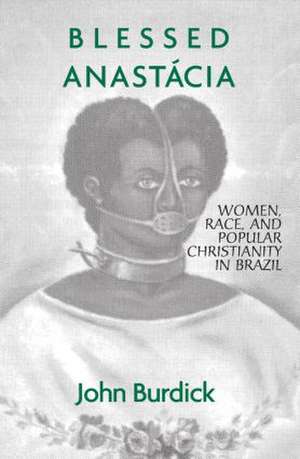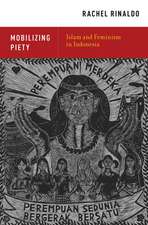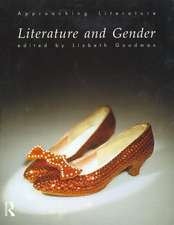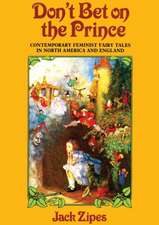Blessed Anastacia: Women, Race and Popular Christianity in Brazil
Autor John Burdicken Limba Engleză Paperback – 6 oct 1998
| Toate formatele și edițiile | Preț | Express |
|---|---|---|
| Paperback (1) | 370.46 lei 6-8 săpt. | |
| Taylor & Francis – 6 oct 1998 | 370.46 lei 6-8 săpt. | |
| Hardback (1) | 1115.69 lei 6-8 săpt. | |
| Taylor & Francis – 13 oct 1998 | 1115.69 lei 6-8 săpt. |
Preț: 370.46 lei
Nou
Puncte Express: 556
Preț estimativ în valută:
70.91€ • 74.50$ • 59.59£
70.91€ • 74.50$ • 59.59£
Carte tipărită la comandă
Livrare economică 12-26 martie
Preluare comenzi: 021 569.72.76
Specificații
ISBN-13: 9780415912600
ISBN-10: 0415912601
Pagini: 256
Dimensiuni: 152 x 229 x 14 mm
Greutate: 0.47 kg
Ediția:New.
Editura: Taylor & Francis
Colecția Routledge
Locul publicării:Oxford, United Kingdom
ISBN-10: 0415912601
Pagini: 256
Dimensiuni: 152 x 229 x 14 mm
Greutate: 0.47 kg
Ediția:New.
Editura: Taylor & Francis
Colecția Routledge
Locul publicării:Oxford, United Kingdom
Notă biografică
John Burdick is Assistant Professor of Anthropology at Syracuse University. He is the author of Looking for God in Brazil (1993).
Recenzii
"A nuanced and brilliant ethnography, this is a major contribution to scholarship." -- Foreign Affairs
"The puzzle of the Brazilian style of race relations has intrigued generations of scholars, but Burdick charts out new territory by examining racism in the context of Afro-Brazilian activism, popular religion, and the cultural politics of gender and desire. Avoiding simple formulas and always attentive to complexity, Burdick has produced both a nuanced ethnography and a contribution to theories of social movements and activist scholarship." -- David J. Hess, professor of anthropology, Rensselaer Polytechnic Institute, and author of Samba in the Night: Spiritism in Brazil
"Blessed Anastacia is a brilliant, passionate study of the realities of race and injustice in Brazil...and represents the very best in new thinking from anthropology and cultural studies about Latin America." -- Orin Starn, author of Nightwatch: The Making of a Movement in the Peruvian Andes
"A nuanced, multidimensional and sensitive analysis of race and popular culture in Brazil." -- Robert Stam, author of Tropical Multiculturalism: A Comparative History of Race in Brazilian Culture and Cinema
"Burdick focuses on the ways in which women of color in Brazil experience three separate forms of Christianity: the inculturated Catholic mass, Pentecostalism, and the cult of Anastacia, a Brazilian symbol of black female slavery...Blessed Anastaciais a model for research into why and how individuals are attracted to particular religious forms and expressions." -- -Hannah W. Stewart-Gambino Latin American Research Review
"In Blessed Anastacia Burdick contributes to a growing literature on the analysis of race in Latin America debunking the myth of "racial democracy" that teaches those who want to believe it exists to interpret inequality mainly in class, not color, terms...This book is a must read for its rich ethnographical, historical, and analytical challenges. It is a book that is truly interdisciplinary and a breath of fresh air for those of us who look to make our research meaningful to a broad audience." -- -Milagros Pena University of Florida
"Blessed Anastacia destroys stereotypes. Analyzing how women of color contend with issues of self-identity and pride via the prism of beauty, love, marriage, family and work within three religious contexts, the author concludes that Christianity can be a useful mechanism for expressing black identity, as well as for confronting racism..His [Burdick's] view of social movements is one in which contradictions, unexpected outcomes and contrariness are accepted as a natural outcome of the complexity of human choices. This is the strength of this work, in which his informants' views dominate rather than the author's." -- Luso-Brazilian Review, 38/1
"It is unusual and refreshing for a scholar to acknowledge openly a motivation for a publication beyond that of pure research. Burdick's beautifully-written ethnography is strengthened by his candor."
"The puzzle of the Brazilian style of race relations has intrigued generations of scholars, but Burdick charts out new territory by examining racism in the context of Afro-Brazilian activism, popular religion, and the cultural politics of gender and desire. Avoiding simple formulas and always attentive to complexity, Burdick has produced both a nuanced ethnography and a contribution to theories of social movements and activist scholarship." -- David J. Hess, professor of anthropology, Rensselaer Polytechnic Institute, and author of Samba in the Night: Spiritism in Brazil
"Blessed Anastacia is a brilliant, passionate study of the realities of race and injustice in Brazil...and represents the very best in new thinking from anthropology and cultural studies about Latin America." -- Orin Starn, author of Nightwatch: The Making of a Movement in the Peruvian Andes
"A nuanced, multidimensional and sensitive analysis of race and popular culture in Brazil." -- Robert Stam, author of Tropical Multiculturalism: A Comparative History of Race in Brazilian Culture and Cinema
"Burdick focuses on the ways in which women of color in Brazil experience three separate forms of Christianity: the inculturated Catholic mass, Pentecostalism, and the cult of Anastacia, a Brazilian symbol of black female slavery...Blessed Anastaciais a model for research into why and how individuals are attracted to particular religious forms and expressions." -- -Hannah W. Stewart-Gambino Latin American Research Review
"In Blessed Anastacia Burdick contributes to a growing literature on the analysis of race in Latin America debunking the myth of "racial democracy" that teaches those who want to believe it exists to interpret inequality mainly in class, not color, terms...This book is a must read for its rich ethnographical, historical, and analytical challenges. It is a book that is truly interdisciplinary and a breath of fresh air for those of us who look to make our research meaningful to a broad audience." -- -Milagros Pena University of Florida
"Blessed Anastacia destroys stereotypes. Analyzing how women of color contend with issues of self-identity and pride via the prism of beauty, love, marriage, family and work within three religious contexts, the author concludes that Christianity can be a useful mechanism for expressing black identity, as well as for confronting racism..His [Burdick's] view of social movements is one in which contradictions, unexpected outcomes and contrariness are accepted as a natural outcome of the complexity of human choices. This is the strength of this work, in which his informants' views dominate rather than the author's." -- Luso-Brazilian Review, 38/1
"It is unusual and refreshing for a scholar to acknowledge openly a motivation for a publication beyond that of pure research. Burdick's beautifully-written ethnography is strengthened by his candor."
Cuprins
Introduction 1. The Everyday Wounds of Color Negras in Love, Family, and Work 2. Spirited Languages The Field of Popular Christianity in Rio de Janeiro 3. The Politics of Mystical Substance Black Women and the Catholic Inculturated Mass 4. What is the Color of the Holy Spirit? Racial/Color Meanings in Pentecostalism 5. The Eyes of Anastácia Political Readings of a Popular Catholic Devotion 6. The Politics of Ethnography Translating Knowledge Claims into Practice Conclusion An Agenda for the Ethnography of Social Movements
Descriere
The weakness of Brazil's black consciousness movement is commonly attributed to the fragility of Afro-Brazilian ethnic identity. In a major account, John Burdick challenges this view by revealing the many-layered reality of popular black consciousness and identity in an arena that is usually overlooked: that of popular Christianity.Blessed Anastacia describes how popular Christianity confronts everyday racism and contributes to the formation of racial identity. The author concludes that if organizers of the black consciousness movement were to recognize the profound racial meaning inherent in this area of popular religiosity, they might be more successful in bridging the gap with its poor and working-class constituency.












